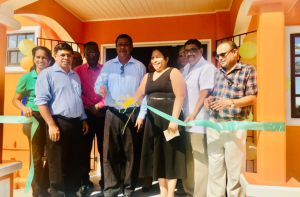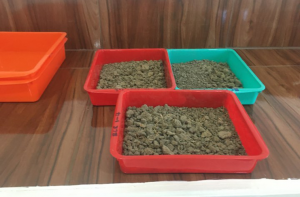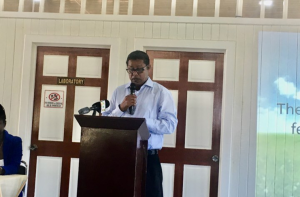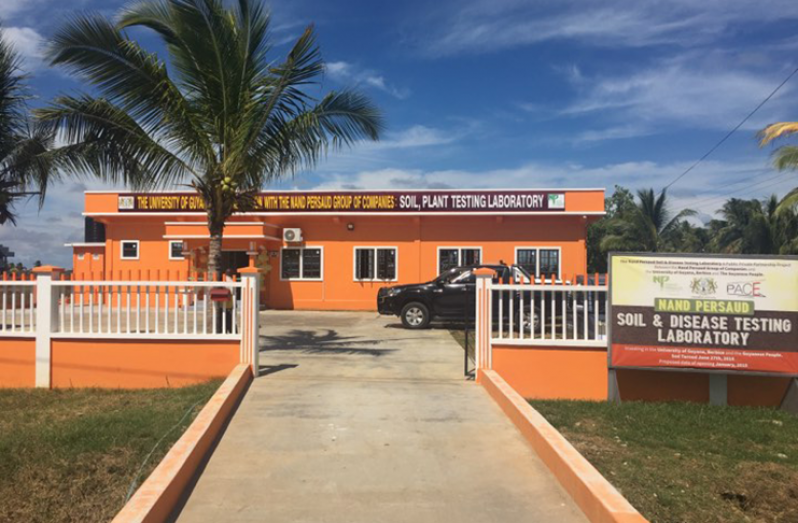THE Nand Persaud Group of Companies, in collaboration with
the University of Guyana, on Monday, commissioned a $40M soil testing
facility at the Tain Campus.
The facility which has the capacity to test soil, water and plant
disease is the brain child of Professor Subramaniam Gomathinayagam,
the Director of the Berbice Campus. Professor Gomathinayagam, who also
celebrated his birthday yesterday, said the commissioning of the centre
was a dream come true for him. He explained that, since he came to
Guyana, several years ago, he had been assisting farmers with their
various crop-related issues and saw the need for a facility which could
make the lives of the farmers easier.

He continued that the multi-million dollar facility will be beneficial,
not only to farmers, but the entire region, and Guyana as a whole and
urged farmers to test their soil prior to planting so that they can be
better able to care for their plants and maximize on use of their
fertilisers.
Deputy Vice Chancellor Philanthropy, Alumni and Civic Engagement
(PACE) Professor Paloma Mohamed, in her remarks, explained that the
project had a very long gestation period, having gone through five
different departments before being approved, but was worth the wait since
it will significantly benefit everyone. She noted that the fact that
the laboratory was located on the University’s property meant that students will get training and jobs, the community will benefit and the university will be receiving a percentage of the earnings from the
facility.
Pro Chancellor, retired Major General Joe Singh also echoed similar
sentiments as he stressed the establishment of the facility was another
use of technology to speed up information and data to
farmers whom he said were the most important people in the agriculture
industry. He underscored the importance of agriculture, especially with
oil and gas sector taking centre stage, as first oil was about to be
extracted.

He appealed to all to not fall prey to the Dutch Disease and hopes
that money would be used wisely and diversify the economy from oil
and gas into agriculture, more particularly, food security and export
earnings. Singh further called on the youths to make use of
technology and get into agriculture as that what was needed more than
ever.
“Young people in particular would be wise to see agriculture not as a
burdensome back-breaking, physically arduous vocation but as something
which is necessary and which can use technology to ensure food
security,” he said.
He also called on those in authority to let good sense prevail to make
funds available to rice farmers to get access to adequate water for
their crop. He said the issue was one of bread and butter and not
political and should take center stage.
Meanwhile Chairman of the Nand Persaud Group of Companies, Rajendra
Persaud, noted that, through use of the facility, rice farmers can
potentially increase their yields by as much as 30%.

“We understand for us to survive and be in business we recognize the
need to be in partnerships where everyone is making a profit and is
happy so that it can be sustainable; and the effort of this lab is
just that. We feel that that the potential is there for the rice
industry to increase yields by 25-30% and that potential is now
realized because the farmers must understand how to treat the soil….
We are putting in the effort because we want to see farmers continue
to be profitable.”
He too made an appeal for an agriculture agenda in the presence of oil
and gas so that Guyana does not end up like other oil producing
countries that focus solely on oil and gas. He noted, from personal
experience, that the Agriculture manufacturing industry was paying the
highest rates of taxes which was unfair, since everyone benefits from
the sector and called for the agriculture manufacturing industry to be
more competitive by allowing the manufacturers to enjoy the same
benefits as those in the oil and gas sector.
Chief Executive officer of the Nand Persaud Group of Companies,
Mohindra Persaud, noted that not only the rice industry stand to
benefit from soil testing but fruit and vegetable farmers as well as
those involved in fish rearing, since the facility tests water and all
soil types. He called for an end of traditional farming where
fertilisers and crops are being planted and applied based on
traditions that have been passed on for many generations. He posited,
that with the scientific data available, all will benefit by being in a
position to make informed decisions. On that note, he issued a call to
the various chambers of commerce in the region to help sponsor testing
for farmers who may not see the need or consider the $8000 per test a
waste of finances.
He also touched on the rice industry in general which he said had the
highest production in Region Six of over 2 million bags of paddy in
the last crop and foresees it to be more profitable with the use of the
lab.

“What is the future of the rice industry? Same response as 40 years
ago. It is getting bigger, better and more profitable. The last crop
in the region produced over 2 million bags of paddy – the largest ever in the Region.”
Also offering brief remarks was Regional Chairman, David Armogan, who
applauded the Nand Persaud Group of Companies and called on, not only
farmers, but those in the construction industry, to make use of the soil
testing facility.
President of the Central Chamber of Commerce, Mohamed Raffik, also
offered congratulations on the establishment of the lab and called on
all politicians to ensure agriculture is paramount on their agenda. He
also called for more emphasis to be placed on the private sector since
it holds the key to generating employment and improving the economic
situation for all, providing the framework and policies are in place.
With Region Six being primarily an agricultural-based economy, the
laboratory, once used correctly, had the possibility to transform the
entire region.












